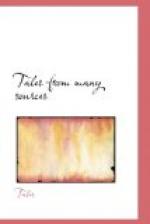The parson had said, “Treat the child fairly. Bring him up as he will have to live hereafter. Don’t make him half pet and half servant.” And following this advice, and her own resolve that there should be “no nonsense” in the matter, Miss Betty had made it a rule that he should not be admitted to the parlor. It bore more heavily on the tender hearts of the little ladies than on the light heart of John Broom, and led to their waylaying him in the passages and gardens with little gifts, unknown to each other. And when Miss Kitty kissed his newly-washed cheeks, and pronounced them “like ripe russets,” Miss Betty murmured, “Be judicious, sister Kitty;” and Miss Kitty would correct any possible ill effects by saying, “Now make your betters, John Broom, and say, ‘Thank you, ma’am!’” which was accomplished by the child’s giving a tug to the forelock of his thick black hair, with a world of mischief in his eyes.
When he was old enough, the little ladies sent him to the village school.
The total failure of their hopes for his education was not the smallest of the disappointments Miss Betty and Miss Kitty endured on his behalf. The quarrel with the lawyer had been made up long ago, and though there was always a touch of raillery in his inquiries after “the young gipsy,” he had once said, “If he turns out anything of a genius at school, I might find a place for him in the office, by-and-by.” The lawyer was kind-hearted in his own fashion, and on this hint Miss Kitty built up hopes, which unhappily were met by no responsive ambition in John Broom.
As to his fitness to be an errand boy, he could not carry a message from the kitchen to the cowhouse without stopping by the way to play with the yard-dog, and a hedgehog in the path would probably have led him astray, if Thomasina had had a fit and he had been despatched for the doctor.
During school hours he spent most of his time under the fool’s cap when he was not playing truant. With his schoolmates he was good friends. If he was seldom out of mischief, he was seldom out of temper. He could beat any boy at a foot race (without shoes); he knew the notes and nests of every bird that sang, and whatever an old pocket-knife is capable of, that John Broom could and would do with it for his fellows.
Miss Betty had herself tried to teach him to read, and she continued to be responsible for his religious instruction. She had hoped to stir up his industry by showing him the Bible, and promising that when he could read it he should have it for his “very own.” But he either could not or would not apply himself, so the prize lay unearned in Thomasina’s trunk. But he would listen for any length of time to Scripture stories, if they were read or told him, especially to the history of Elisha, and the adventures of the judges.
Indeed, since he could no longer be shut up in the drying-ground, Thomasina had found that he was never so happy and so safe as when he was listening to tales, and many a long winter evening he lay idle on the kitchen hearth, with his head on the sheep dog, whilst the more industrious Thomasina plied her knitting-needles, as she sat in the inglenook, with the flickering firelight playing among the plaits of her large cap, and told tales of the country side.




